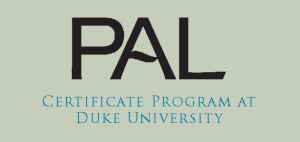Download the PAL Certificate Brochure
Duke Course: PHIL 947S/ LIT 882S–Philosophy and Literature
Tues 1:25-3:55, Friedl Building 126
Disciplines in the humanities, social sciences, probably the natural science too, are defined and distinguished not by necessary and sufficient conditions that define what the discipline is or is about, but rather by family resemblances in subject matter and among certain kinds or modes of speaking, writing, and expressing. We will look at what, if anything, defines the subject matter, the boundary(ies), the methodology(ies), and the products of analytic philosophical discourse and literature (mostly novels & plays), respectively. We will discuss question such as these: Are there ways of treating philosophical problems in value theory (ethics, aesthetics), epistemology, and metaphysics that are well-suited, even more well-suited, to expression in literature than in standard analytic philosophical discourse? What can literature teach about philosophical problems that relate to mind, morals, self-knowledge, knowledge of other minds, identity, and the meaning of life? What kind of knowledge, if any, does literature provide or produce? What are the advantages and disadvantages of different idioms, different disciplines for addressing different philosophical problems? Readings from Sophocles, Aristotle, Plato, Dostoevsky, Kierkegaard, Nietzsche, Sartre, Murdoch, Woolf, Beckett, and contemporary philosophers like Rorty, Nussbaum, Nehamas. (Taught by Professor Flanagan.)
AMI 640/ French 510/ VMS 552/ Lit–Citizen Godard
Tues 4:40-7:10pm
The Honorary Oscar awarded in November 2010 to the Franco-Swiss director has enraged some in Hollywood and rekindled accusations of anti-Semitism. These virulent reactions indicate that is still difficult today to come to terms with the work of the enfant terrible of French cinema. This course explores the complex interactions of poetics and politics in Godard’ films. It covers the up-to-date filmography, from the French New Wave through the experimental phase of the Dziga Vertov group to the recent Histoire(s) du cinéma and Film socialisme, as well as includes his articles and essays. Drawing on various texts by the Jena Romantics, Brecht, Merleau-Ponty, Althusser, Benjamin and Blanchot, this seminar situates Godard’s work within its own moving theoretical and political contexts of production, while investigating its aesthetic, philosophical and ethical implications. What are the possibilities and limitations of cinema as modern art? What are the relationships between image and language, film and ideology? How do the poetic and the historical interact within cinema? What is cinema in the digital era of instant communication? We will explore these questions through the concepts of montage, cinéma engagé, archive and cinematic memory. We will also study the impact of Godard’s work on philosophers such as Deleuze, Rancière and Badiou who envisage cinema as a “thinking form”. This seminar is taught in English with French discussion sessions available for minors and majors. (Taught by Professor Saliot.)
UNC Course: GERM 880–Man, Animal Cinema
TuEs 4:40-7:10pm, Dey Hall 404
This course proposes a cinematic investigation into—and intervention in—the historical and current debate about the ontological, political, biological, and emotional relationships between human beings and animals. To familiarize ourselves with this fundamental debate, we will read not only key philosophical texts, but also literary and scientific texts that approach this problem from the perspective of their own media and disciplines. However, the central goal of this course will be to consider the role of technology and mediation—and of the cinema in particular—for the “question” of the animal. To this end, we will confront philosophy and science with a variety of films as well as engage film criticism that focuses on the ways in which film communicates, mediates, and transforms creaturely life. What happens to animals when they are technologically mediated, what happens to technology in conjunction with the animalistic, and what happens to (human) spectators in the film experience of wild, anthropomorphous, strange, or horrifying creatures? (Taught by Professor Pollmann.) Download Full Course Description.
Information about interinstitutional enrollment can be found here.

One Response to Graduate Certificate Courses– Spring 2014
[…] Spring 2014 […]